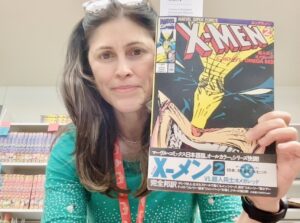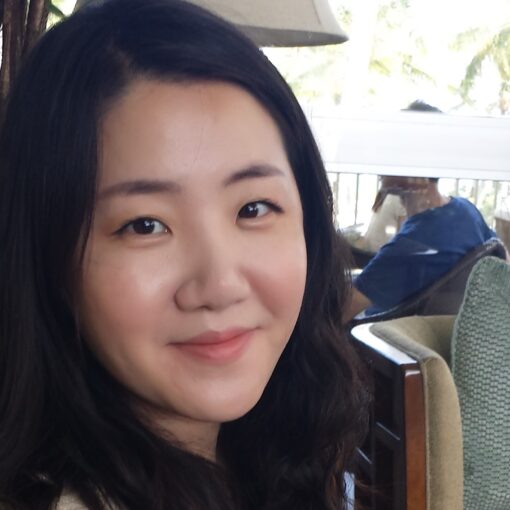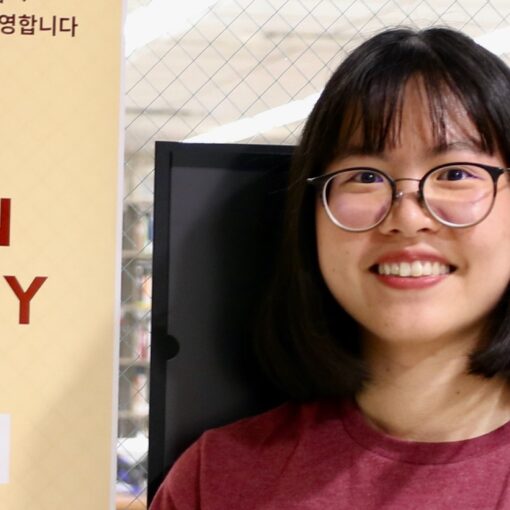Dr. Ann Marie Davis (she/her/hers) has been working at The Ohio State University Libraries since May 2016. Her current position is Associate Professor and Japanese Studies Librarian.
 How did your journey in working with East Asian libraries and collections begin?
How did your journey in working with East Asian libraries and collections begin?
Although I’ve been a librarian for less than a decade, I’ve been a researcher and educator in East Asian Studies for over twenty years. My previous experiences as a graduate student and professor of history got me interested in playing a more active role in building and promoting EA collections. I earned an MA in East Asian Studies at Harvard in 2001, and for a research paper there, I began working with a collection of British Foreign Office Documents on microfilm that was not widely available anywhere else in North America. I became spellbound with the process of locating rare historical documents for my research in Japanese history. As a PhD student at UCLA, I eventually became a teaching fellow and worked closely with the research librarians there to bring rare and special collections into my courses. Then finally, as an assistant professor of Japanese History (Connecticut College, 2009-16), I continued to work closely with our research librarians, and we collaborated on a couple of very exciting digital exhibits with my students. Their influence on me and my ensuing MLS degree and transition from a traditional faculty position to that of research librarian is described in a short article I wrote for the #AsiaNow blog with the Association for Asian Studies (AAS). I’m so glad I made this career change – I feel I have one of the best jobs in the world–building unique collections, sharing knowledge about Japan and East Asia with diverse users, and collaborating with faculty, educators, and scholars in Ohio and beyond. Doing this work at a flagship state university, where public outreach and K-14 teaching is an important part of our mission, is also a pleasure and honor for me.
What did you enjoy most about your career in East Asian librarianship?
There is so much I love, but I feel really lucky to work with our manga collection and several other special collections at our Rare Books & Manuscripts Libraries (RBML) and Theatre Research Institute (TRI), to name a few. My collection development responsibilities include acquiring rare and distinctive materials from and about Japan, and I love this role identifying unique materials that will inspire other scholars, educators, and students. Our library also has an amazing team of preservation specialists, reformatting, and digitization experts who help us prepare our rare materials for teaching on campus and online. It’s a real privilege to work with so many talented specialists who are also passionate about our university collections and promoting scholarship.
What did you regard as your achievements/accomplishments in the field?
One of the things I’m most proud of is working with the Thomas Gregory Song Papers and the Song Family Papers. After bringing these two collections to our Rare Books & Manuscripts Library (RBML), I worked with the donor to create a research award program for students who want to pursue projects making significant use of these collections (which document issues of mobility, gender, and technology before, during, and after the Pacific War). Since the creation of the Thomas Gregory Song Research Award, I’ve had the opportunity to mentor 3 different students in their projects, which, in turn, evolved respectively into a senior capstone paper for the History Department, a digital exhibit for our Libraries, and a conference paper for AAS-in-Asia in 2023. Creating the research award required collaborating closely with many different stakeholders in our library and across campus-–including our finance and development offices, human resources, communications, and our teaching and learning teams. I was really happy to see the sum of this work lead to these amazing opportunities for the student awardees. I am also proud to continue working with the donor and various members of her family to ingest more of the Song family papers and heirlooms, and to conduct oral histories with them, which we will also store in RBML.
What change(s) and trend(s) in East Asian librarianship had you witnessed and envisioned?
I get really excited about the potential for teaching and research in the digital humanities – which has opened up some wonderful new opportunities for student-centered learning and research projects, as well as for open access and collaborative scholarship. The digital humanities also provide a unique medium for promoting and exploring special collections, and for crowdsourcing the dispersed yet powerful “hive mind” of research, collections, and DH specialists from around the world.
Tell us about your favorite book or series:
I tend to like historical fiction, especially novels that expose me to new cultures and settings. I also enjoy autobiographies, especially when read by the author on audiobooks (it sounds like they are talking directly to you!). Through my kids, I’ve had a chance to branch out and read some dystopic science fiction series, which I’ve enjoyed, too, surprisingly–-like the Arc of the Scythe series (Neal Shusterman) and the Legend Series (Marie Lu). Since this is an East Asian Studies group, I will note that recently I read the book “Babel: An Arcane History” (aka “Babel: Or the Necessity of Violence: An Arcane History of the Oxford Translators’ Revolution”) by R. F. Kuang, which has really stuck with me. It’s categorized as speculative fiction, set in the early 19th century, and explores the crucial role of language and translation in underpinning the British empire. In particular, some of the main characters, student trainees in an elite translation program at Oxford University, travel to Guangzhou, China to support trade negotiations between Jardine Matheson & Co and the famous Chinese official, Lin Zexu. As the students come face-to-face with the deleterious effects of opium and the British disregard for Chinese law, they are sickened by the exploitative British system. Eventually, they return to London and decide to foment a student revolution by taking down their translation offices and libraries at Oxford. It’s a wild story about really smart book nerds who eventually decide to destroy a powerful set of rare books and scholarship in order to stop the Opium Wars.
Tell us some fun facts about you:
Last year, my very active older brother introduced my kids to rock climbing. I accompanied them on the excursion, originally just as an observer, but then I decided to give it a try. I’ve been hooked ever since. The whole family joined the local rock-climbing gym last summer, and now we all go every week… and I keep spending all my money on rock climbing gear.





